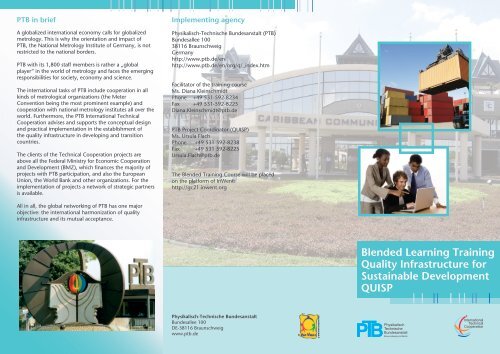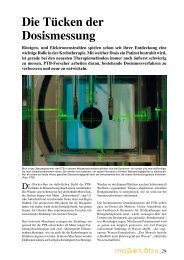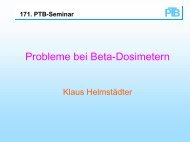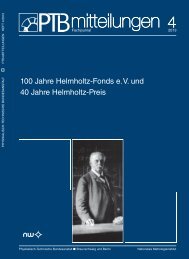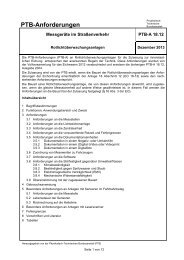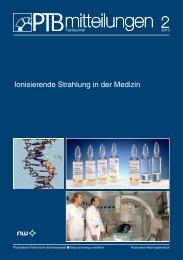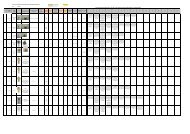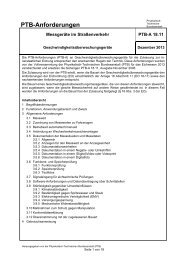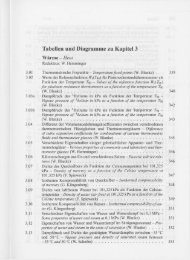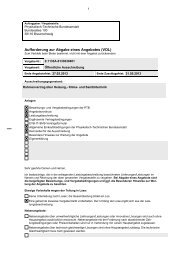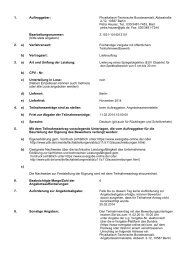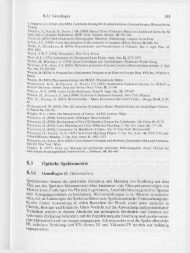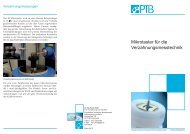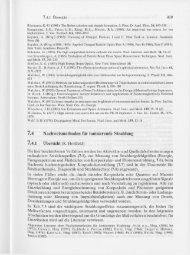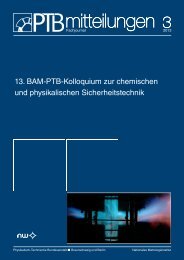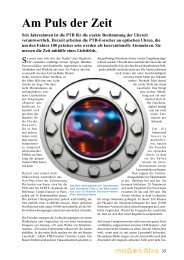Blended Learning Training Quality Infrastructure for Sustainable - PTB
Blended Learning Training Quality Infrastructure for Sustainable - PTB
Blended Learning Training Quality Infrastructure for Sustainable - PTB
Create successful ePaper yourself
Turn your PDF publications into a flip-book with our unique Google optimized e-Paper software.
<strong>PTB</strong> in brief<br />
A globalized international economy calls <strong>for</strong> globalized<br />
metrology. This is why the orientation and impact of<br />
<strong>PTB</strong>, the National Metrology Institute of Germany, is not<br />
restricted to the national borders.<br />
<strong>PTB</strong> with its 1,800 staff members is rather a „global<br />
pla yer“ in the world of metrology and faces the emerging<br />
responsibilities <strong>for</strong> society, economy and science.<br />
The international tasks of <strong>PTB</strong> include cooperation in all<br />
kinds of metrological organizations (the Meter<br />
Convention being the most prominent example) and<br />
cooperation with national metrology institutes all over the<br />
world. Furthermore, the <strong>PTB</strong> International Technical<br />
Cooperation advises and supports the conceptual design<br />
and practical implementation in the establishment of<br />
the quality infrastructure in developing and transition<br />
countries.<br />
The clients of the Technical Cooperation projects are<br />
above all the Federal Ministry <strong>for</strong> Economic Cooperation<br />
and Development (BMZ), which finances the majority of<br />
projects with <strong>PTB</strong> participation, and also the European<br />
Union, the World Bank and other organizations. For the<br />
implementation of projects a network of strategic partners<br />
is available.<br />
All in all, the global networking of <strong>PTB</strong> has one major<br />
objective: the international harmonization of quality<br />
infrastructure and its mutual acceptance.<br />
Implementing agency<br />
Physikalisch-Technische Bundesanstalt (<strong>PTB</strong>)<br />
Bundesallee 100<br />
38116 Braunschweig<br />
Germany<br />
http://www.ptb.de/en<br />
http://www.ptb.de/en/org/q/_index.htm<br />
Facilitator of the training course<br />
Ms. Diana Kleinschmidt<br />
Phone +49 531-592-8234<br />
Fax +49 531-592-8225<br />
Diana.Kleinschmidt@ptb.de<br />
<strong>PTB</strong> Project Coordinator (QUISP)<br />
Ms. Ursula Flach<br />
Phone +49 531 592-8238<br />
Fax +49 531 592-8225<br />
Ursula.Flach@ptb.de<br />
The <strong>Blended</strong> <strong>Training</strong> Course will be placed<br />
on the plat<strong>for</strong>m of InWent:<br />
http://gc21.inwent.org<br />
Physikalisch-Technische Bundesanstalt<br />
Bundesallee 100<br />
DE-38116 Braunschweig<br />
www.ptb.de<br />
<strong>Blended</strong> <strong>Learning</strong> <strong>Training</strong><br />
<strong>Quality</strong> <strong>Infrastructure</strong> <strong>for</strong><br />
<strong>Sustainable</strong> Development<br />
QUISP<br />
Physikalisch<br />
Technische<br />
Bundesanstalt<br />
Braunschweig und Berlin<br />
Physikalisch<br />
Technische<br />
Bundesanstalt<br />
Braunschweig und Berlin
Objective of the training?/Why QUISP?<br />
The <strong>Blended</strong> <strong>Learning</strong> <strong>Training</strong> ‘<strong>Quality</strong> <strong>Infrastructure</strong> <strong>for</strong><br />
<strong>Sustainable</strong> Development’ aims to deepen the knowledge<br />
of and in<strong>for</strong>mation about <strong>Quality</strong> <strong>Infrastructure</strong> related<br />
disciplines (Metrology, Standardization, Testing,<br />
Certification and Accredication) with the purpose of<br />
1.<br />
2.<br />
enhancing the general understanding of the<br />
economic role and importance of these disciplines<br />
and,<br />
improving skills and abilities in dealing with<br />
standards-related subjects in the context of<br />
international trade negotiations.<br />
The training will encourage the establishment of lasting<br />
professional relationships among all course participants,<br />
course management and all resource persons in order to<br />
support the international exchange of in<strong>for</strong>mation and<br />
experience and contribute to the continuous<br />
advancement of quality infrastructure disciplines in the<br />
target countries.<br />
Who can participate ?<br />
The <strong>Blended</strong> <strong>Learning</strong> <strong>Training</strong> is designed <strong>for</strong><br />
participants from the Caribbean and African regions,<br />
namely <strong>for</strong> administration specialists, executives and<br />
decision-makers dealing with trade agreements, as well<br />
as chamber of industry and commerce staff. Participants<br />
should have computer literacy and self regulation skills.<br />
The <strong>Blended</strong> <strong>Learning</strong> <strong>Training</strong> is free of charge, and<br />
upon request, <strong>PTB</strong> will cover travelling costs <strong>for</strong> selected<br />
participants.<br />
Organization and Contents of the <strong>Training</strong><br />
The first part of the <strong>Blended</strong> <strong>Learning</strong> <strong>Training</strong> dealing with<br />
standardization and trade related topics consists of two faceto-face<br />
workshops and a tutor guided intermediate 6 months<br />
e-learning phase<br />
Kickoff<br />
Workshop<br />
E-<strong>Learning</strong><br />
The training will start with a four day kickoff workshop on<br />
standards and related topics. This workshop will be organized<br />
in cooperation with CARICOM Regional Organisation <strong>for</strong><br />
Standards and <strong>Quality</strong> (CROSQ) and will take place in the<br />
Caribbean in November 2009.<br />
This workshop aims at building teams, introducing the topic,<br />
identifying the course-related prerequisites and expectations<br />
as well as preparing the learners <strong>for</strong> the e-learning section of<br />
the training.<br />
During the e-learning phase, six online chapters will be<br />
offered, accessible <strong>for</strong> about one month each, each including<br />
about 6 hours of interactive multimedia learning material:<br />
Chapter 1: Fundamentals of Standardization<br />
Chapter 2: Economic Impact of Standardization<br />
Chapter 3: Technical Regulations and Standards<br />
Chapter 4: Con<strong>for</strong>mity Assessment<br />
Chapter 5: Standards and the National QI<br />
Chapter 6: Standards and Trade Negotiations<br />
Final<br />
Workshop<br />
Additionally, there will be complementary online<br />
collaboration tasks, specially designed to transfer the<br />
chapter’s content to practical know how. During the<br />
entire e-learning phase, participants will be accompanied<br />
and supported online, both by facilitators and experts.<br />
After the e-learning section, the training will be<br />
concluded by a second face-to-face workshop taking<br />
place in Germany. This second face-to-face workshop will<br />
include presentations of training results, as well as expert<br />
lectures and excursions, among others.<br />
Participants will obtain a certificate testifying that they<br />
successfully completed the training after having passed<br />
the final asessment and preparing a presentation to be<br />
given during the concluding workshop.<br />
Subsequent to the <strong>Blended</strong> <strong>Learning</strong> <strong>Training</strong>, both<br />
knowledge and networks will be consolidated in an online<br />
follow-up.<br />
The <strong>Blended</strong> <strong>Learning</strong> training is being developed in close<br />
cooperation with DIN e.V. (German Institute <strong>for</strong><br />
Standardization) and InWent – Capacity Building<br />
International, Germany.<br />
InWent - Capacity Building<br />
International, Germany, is a<br />
non-profit organization with<br />
worldwide operations dedicated<br />
to human resource development,<br />
advanced training, and dialogue.<br />
www.inwent.org<br />
DIN, the German Institute <strong>for</strong><br />
Standardization, develops<br />
standards as a service to industry,<br />
the state and society as a whole.<br />
www.din.de


